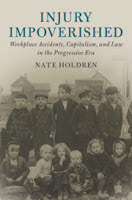John Fabian Witt, Yale Law School, has posted Radical Histories/Liberal Histories in Work Injury Law, a review forthcoming in the American Journal of Legal History of Nate Holdren’s Injury Impoverished: Workplace Accidents, Capitalism, and Law in the Progressive Era:
Nate Holdren has written a brilliant, impassioned, and intellectually stimulating book on the legal history of industrial accidents. According to Holdren, work injuries were at their core a form of labor exploitation. He describes the law of work accidents as a machinery of injustice that bolstered the legitimacy of a violent and inhuman capitalist system. He fiercely critiques the workers’ compensation reforms enacted by progressive reformers a century ago as legitimating a form of systematic labor violence. He insists on recognizing and attending to the dignity of each accident victim, both in the content of his argument and as a matter of literary form. Injury Impoverished is a welcome if unsettling rebuke to complacent accounts of the field, perhaps my own among them. But Holdren’s analysis also raises many questions. Holdren attributes little value to the dramatically safer workplaces of the middle of the twentieth century. His cautious admiration for the litigation system of the years before workers’ compensation rests on a fantastical conception of the way 19th-century tort law actually worked. He calls for an impossibly demanding form of "justice as recognition" from the law. He misses the ways in which workers co-opted new forms of accident law and turned them to their own interests. And his single-minded focus on commodification and the point of production leads him to discount the surrounding political and legal institutions that shaped the social meaning of work injuries.
--Dan Ernst




